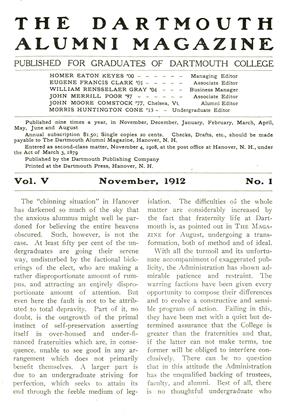In the account of Dartmouth Night reference is made to a definition, or 'rather an explanation, of the "Dartmouth Spirit," which President-Emeritus Tucker contributed to Dean Emerson's symposium on the subject. Doctor Tucker's statement so immediately and clearly cuts through the usual superficialities of such discussions that it is reprinted here apart, for the sake of giving it deserving emphasis. That the traditionally best things about Dartmouth are due primarily to the environment of the place and not to any unusual basic quality in' the men of Dartmouth themselves, is an idea that has occurred to many thoughtful observers. It has served, indeed, to ward off fears of grave changes arising from the growth of the College and the increasing extension of its constituency. But, however definitely the idea may have arisen in other minds, it has never yet received such adequate expression as now, in Doctor Tucker's words. My dear Mr. Emerson:-
You ask me what I understand to be the meaning of the so-called Dartmouth spirit. If you should ask any general observer how the Dartmouth spirit differed from that of most other colleges he would tell you, I think, that the difference was of degree more than of kind—that there was simply more of it, that it was more in evidence, more "easily provoked, more irrepressible. The answer would be true, but it would only make your question more interesting. And yet there is no mystery about the Dartmouth democracy. It is the natural outgrowth of the local situation. That situation, as you know, has been practically unchanged for more than a hundred years. There have never been any dominating or disintegrating influences, political or social, at work from without upon the college community. Naturally there has grown up an unusual spirit of personal independence, and an equally rare spirit of comradeship. Students coming in increasing numbers from all over the country have done much to prevent provincialism, but they have always surrendered to the spirit of democracy which they found here. Probably there is no college where students are more closely related to one another, or more personally related to the college. The absence in so large a degree of organized and formal relations shows the reality of this underlying and almost unconscious relation. The Dartmouth democracy grows as the result of an accumulating inheritance and of a steadfast environment, especially of the latter. If the college were transplanted to Boston or New York or Chicago I do not know how long the spirit of the inheritance would master the spirit of environment. Here they are one.
I think, however, that the real test of college spirit anywhere (it ought to be the constant test of the Dartmouth spirit) is its power to make the loyalties and enthusiasms of college life tributary in the most effective way to the great academic virtues—the love of intellectual liberty, loyalty to truth, and respect for the rights of others. The true effect of college spirit is seen, certainly at its best, not in the undergraduate but in the graduate. It takes from ten to twenty years for a college to answer the call which Phillips Brooks used to say was going the rounds of the colleges of the land—"Show us your man."
Your perspective, as you look back into the personal life of the College, is much longer than mine, but I am sure that you have reason to feel, as T do, that in spite of disappointments and failures, the Dartmouth spirit has not wrought in vain.
I am, Most sincerely yours,
 View Full Issue
View Full Issue
More From This Issue
Article
-
 Article
ArticleTimber Gut in Grant Sufficient to Provide Boardwalk to Smith
June 1950 -
 Article
ArticleCrusade for Freedom
October 1951 -
 Article
ArticleReynolds Scholars
MAY 1970 -
 Article
ArticleVox in the Box
NOVEMBER 1997 -
 Article
ArticleSAMSON OCCOM, A PICTURESQUE DIARIST
JANUARY, 1928 By Eric P. Kelly '06 -
 Article
ArticleOut of the Sea Bag
June 1944 By The Defoe Rollover








